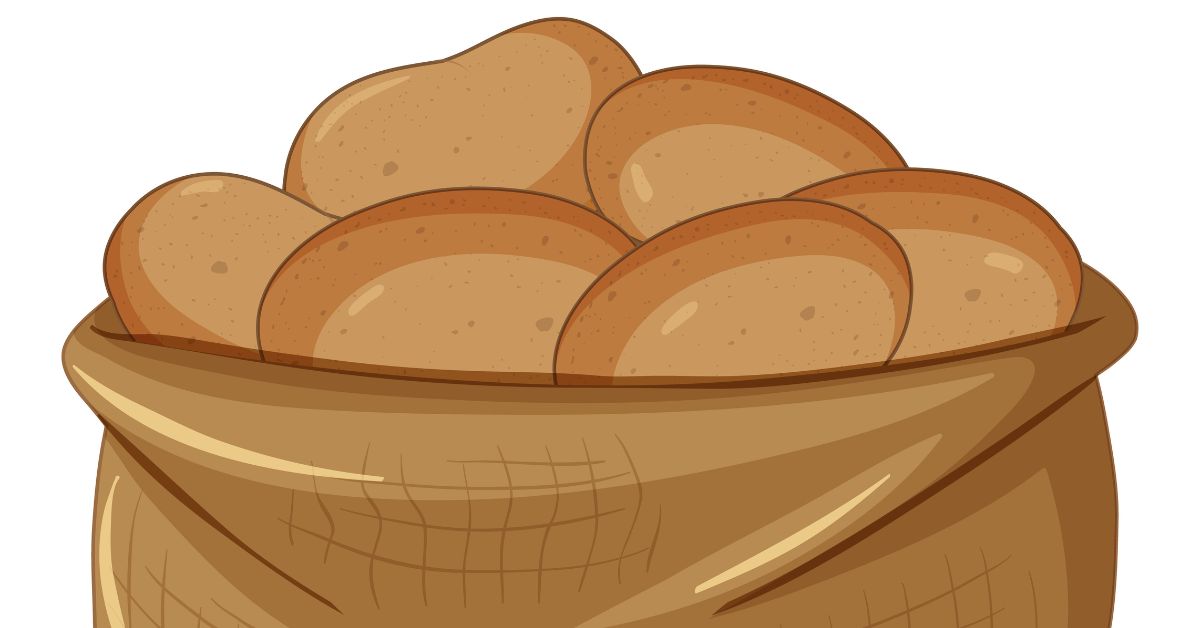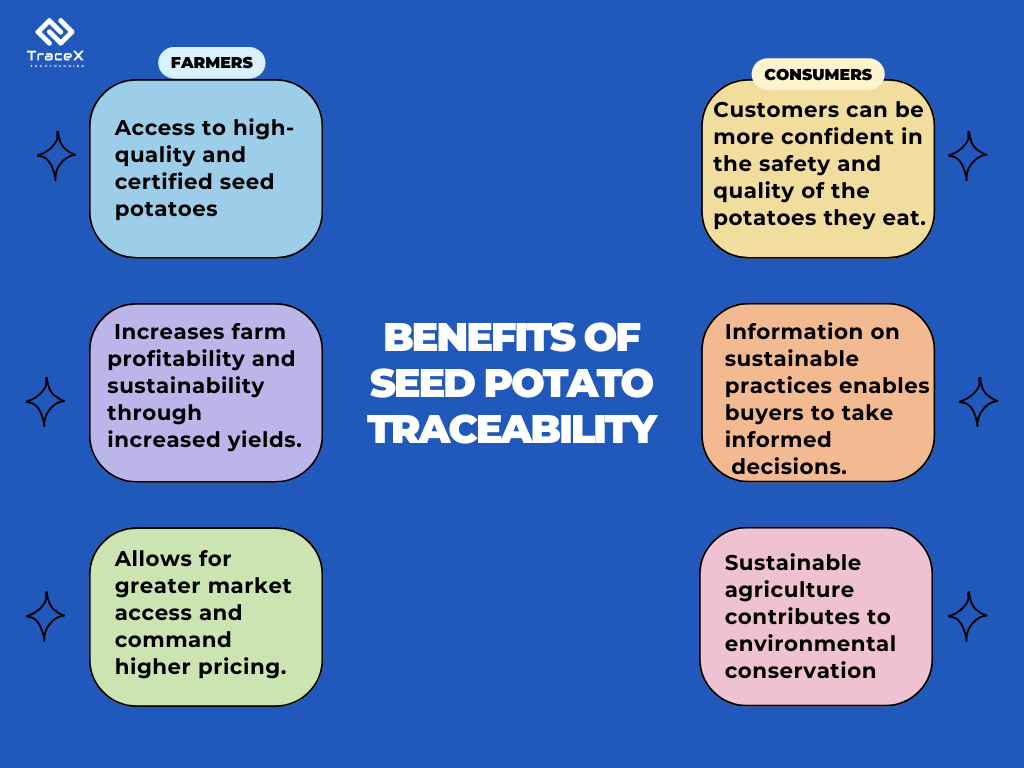Contact: +91 99725 24322 |
Menu
Menu
Quick summary: Explore the journey of seed potatoes from farm to fork with our comprehensive guide on seed potato traceability. Discover how blockchain technology ensures transparency and quality throughout the supply chain.

The humble potato, a global staple and culinary chameleon, takes a fascinating journey from farm to fork. But have you ever wondered about the seed potato that started it all? Seed potato traceability is emerging as a game-changer, ensuring transparency and quality throughout the potato supply chain.
The potato growing industry is dominated by a few large players, with the top 10 producers growing 65% of the world’s potatoes.
Potatoes rank as the world’s fourth most crucial food crop, following corn, rice, and wheat. With the global population on the rise, the significance of potatoes is expected to grow further due to their distinct advantages over other crops like corn, rice, and grains.
The potato, scientifically known as Solanum tuberosum, is a perennial vegetable typically grown annually from seed potatoes, which are small tubers or tuber pieces cultivated specifically for planting and are crucial for disease prevention.
Potatoes can thrive in diverse environments, with temperature being a critical factor. They require a cool but frost-free growing season, with tuber growth significantly slowing above 30°C or below 10°C. Optimal yields are achieved when the average daily temperature ranges from 18 to 20°C.
As a result, potatoes are typically planted in early spring in temperate zones and late winter in warmer regions, ensuring cultivation during the coolest months in hot tropical climates. In some sub-tropical highlands, favourable mild temperatures and abundant solar radiation enable year-round potato cultivation for farmers.
Potatoes are an important global food source, giving necessary minerals and energy to millions of people. They are versatile, nutritious, and adaptable to several climates, making them a common component in many diets. However, traditional seed potato distribution confronts issues such as disease transmission, a lack of quality control, and limited availability for small-scale producers.
The journey of potatoes commences with the meticulous cultivation process. Farmers meticulously choose potato varieties suited to their specific climate and soil conditions, planting small tubers known as seeds in well-prepared soil during the spring. Proper spacing and nutrient-rich soil are crucial for ensuring healthy growth.
Planting should ideally occur up to two weeks before the average date of the last frost, with soil temperatures at 45°F or warmer. Potatoes thrive in various soil types, with well-drained sandy loams being optimal. The soil should be tilled to a depth of 16 inches and irrigated to create a moist seed bed. Commercial fertilizer or well-rotted manure may be applied, although poorly aged manure can lead to issues such as burning and the introduction of diseases and weed seeds.
Once planted, potatoes demand diligent care and attention. Adequate irrigation, nutrient management, and protection from pests and diseases are essential for a successful crop. Monitoring growth progress is crucial, with farmers ensuring optimal conditions for plant development.
Harvesting marks the next phase, typically occurring three to four months post-planting. Various harvesting methods are employed based on the scale of the operation. Hand harvesting is common in smaller farms, where workers delicately dig up potatoes from the soil. Larger-scale operations utilize machinery like potato harvesters or diggers for mechanical lifting.
Following harvesting, potatoes undergo sorting and grading to separate them based on size, shape, and quality. This process, carried out through automated sorting machines or manual techniques, eliminates damaged or blemished tubers, ensuring only high-quality produce reaches the market.
Storage and distribution come next to preserve freshness and extend shelf life. Specialized storage facilities maintain precise temperature and humidity conditions to prevent sprouting and deterioration. Potatoes are then transported to distribution centers or retailers for consumer access, undergoing meticulous packaging, labeling, and logistical management to ensure optimal delivery.
At the market, potatoes are showcased for consumer selection before embarking on their final journey to tables worldwide. Whether purchased from grocery stores, farmer’s markets, or directly from farms, potatoes offer endless culinary possibilities, highlighting their versatility and nourishing qualities in everyday meals.
The complexity of the potato supply chain is intensified by the cultivation process. Seed potatoes, essential for potato growth, introduce an additional layer of complexity as the primary seed potato producers may not align with the major potato producers.
Overall, seed potato traceability not only improves sustainable agriculture and food security, but it also creates confidence, transparency, and integrity in the potato business, which benefits farmers, consumers, and stakeholders.
Unlock the Secrets to Seamless Supply Chains and Enhanced Transparency
Discover the Best Practices of Traceability
Paper-based methods have traditionally been used to track seed potatoes, but they have drawbacks like as manual data input errors, a lack of real-time information, and the risk of loss or damage. Digital platforms and QR codes provide a more effective and dependable solution. QR codes can be placed to seed potato packaging or tags, providing stakeholders with precise information about seed origins, quality, and handling procedures by scanning the code with a smartphone. This allows for real-time tracking and traceability throughout the supply chain, increasing transparency and responsibility.
Integrating blockchain technology provides further benefits by creating an immutable and transparent ledger of transactions. Every transaction, from seed generation to distribution and sale, is documented in a decentralised database to ensure data integrity and security. Blockchain technology builds confidence and accountability by allowing parties to verify the validity and history of seed potatoes, lowering the risk of fraud and counterfeit seeds. Furthermore, blockchain-based traceability solutions can improve process efficiency, lower administrative costs, and enable regulatory compliance.
Data collecting locations are strategically located across the supply chain, such as seed manufacturing facilities, storage warehouses, distribution centres, and points of sale. At each data collecting point, pertinent information such as seed variety, amount, quality assessments, and handling techniques are recorded and connected to the unique identification stored in the QR code or blockchain. This thorough data collection allows stakeholders to monitor and track seed potatoes throughout the supply chain, assuring quality control, mitigating risks, and increasing overall efficiency and transparency.
The TraceX blockchain solution revolutionizes seed potato traceability by offering a transparent and immutable ledger that records every step of the seed potato supply chain. Here’s how TraceX helps in seed potato traceability:
End-to-End Visibility: TraceX provides end-to-end visibility into the journey of seed potatoes, from cultivation to distribution. Each transaction, including planting, harvesting, storage, and transportation, is securely recorded on the blockchain, ensuring transparency at every stage.
Authentication of Seed Potatoes: With TraceX, each seed potato is assigned a unique digital identity recorded on the blockchain. This identity includes essential information such as variety, origin, quality parameters, and certifications. Farmers can verify the authenticity of seed potatoes by accessing this information, thereby preventing the use of counterfeit or inferior seeds.
Quality Assurance: TraceX enables real-time monitoring of seed potato quality throughout the supply chain. Parameters such as moisture content, disease resistance, and genetic purity can be recorded and tracked on the blockchain. This ensures that only high-quality seed potatoes are distributed to farmers, leading to improved crop yields and reduced risk of disease outbreaks.
Compliance with Regulations: By leveraging TraceX, seed potato producers can easily demonstrate compliance with regulatory requirements and industry standards. All relevant data, including compliance certificates, test results, and audit reports, are securely stored on the blockchain, facilitating seamless regulatory audits and inspections.
Enhanced Trust and Transparency: The transparent nature of the blockchain instills trust among stakeholders, including farmers, distributors, and consumers. Farmers can confidently trace the origin of seed potatoes and verify their quality, while distributors and consumers can make informed decisions based on reliable information recorded on the blockchain.

The deployment of seed potato tracing systems may provide difficulties, particularly for small-scale producers. The expense of implementing digital traceability technology such as QR codes and blockchain integration can be too expensive for farmers with low financial means. Furthermore, farmers in some locations may struggle to use and benefit from traceability systems due to a lack of digital literacy.
Furthermore, worries about data security and privacy may develop, particularly when sensitive information is collected and stored on digital tracing systems. Farmers and stakeholders may be concerned about the risk of data breaches or unauthorised access to their information.
Addressing these issues necessitates new solutions that are accessible, economical, and user-friendly for small-scale farmers. Furthermore, maintaining strong data security measures and transparent data handling techniques will help farmers and stakeholders gain confidence in seed potato tracking systems.
The integration of traceability with other agricultural technologies, such as precision farming, can improve overall efficiency and productivity in potato agriculture. By combining traceability data with precision farming techniques such as GPS-guided equipment and sensor technologies, farmers may make more informed decisions about seed selection, planting density, irrigation, and fertility. This connection allows for more precise resource management, higher crop yields, and increased sustainability. For example, traceability data on seed quality and origin can help with precision planting decisions, while real-time monitoring of crop health and environmental conditions can be utilised to adapt management procedures accordingly. Overall, combining traceability and precision farming technologies provides a comprehensive approach to potato cultivation, increasing productivity while reducing environmental impact.
Finally, seed potato traceability offers a transformative chance to improve the efficiency, sustainability, and transparency of potato production. While implementation costs, digital literacy gaps, and data security concerns must be addressed, the benefits of traceability, such as increased food safety, quality assurance, and access to premium markets, exceed the drawbacks. Furthermore, integrating traceability with other agricultural technologies, such as precision farming, provides synergistic benefits that improve crop management and resource utilisation. As the worldwide demand for safe, sustainable, and traceable food grows, investing in seed potato traceability becomes not only a necessity but also a strategic imperative for the agriculture industry. By adopting traceability, stakeholders can secure the long-term viability and resilience of potato production systems while satisfying the changing needs of consumers and markets.
